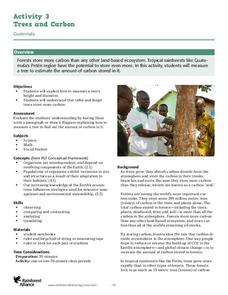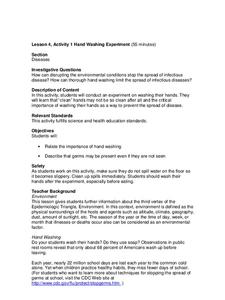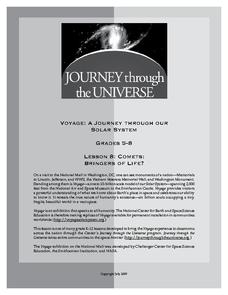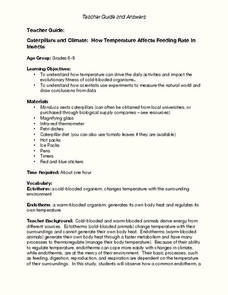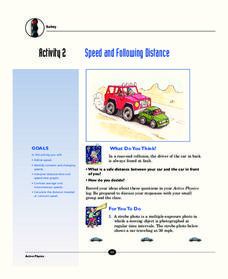Rainforest Alliance
Forests of Guatemala
With 90 percent of its land area covered in forests, Suriname, a country in South America, contains the largest percentage of forests throughout the world. Here is an activity that brings classmates together to learn about the...
Rainforest Alliance
Trees and Carbon
You'll find everything but the kitchen sink here ... or just a carbon sink. In the activity, pairs or groups of middle school learners go outside and measure a tree's circumference and height to estimate its carbon storage potential and...
US National Library of Medicine
Science and Society: Preventing the Spread of Disease
Looking for a valuable resource on the spread of infectious diseases? Here is a lesson in which pupils simulate the spread of diseases and learn about how to prevent them from spreading. Class members read case studies about diseases,...
Centers for Disease Control and Prevention
Hand Washing Experiment
An engaging experiment allows scholars to understand why the recommendation is to wash for 20 seconds with soap and water — while making them aware of their own habits!
Environment Agency - Abu Dhabi
Sedimentation
Starting with a presentation, pupils learn about how sedimentary rocks form. They then create their own sedimentation bottle to observe the process.
Journey Through the Universe
Going through a Phase
Ignore the full moon, it's just a phase. Young scholars observe and record the moon during a full cycle before learning to predict future phases. Then the instructor leads a discussion on the other solar system objects that also go...
Journey Through the Universe
Comets: Bringers of Life?
Young scientists investigate the elements found in our solar system and then construct a model of a comet. They apply their new knowledge to the formation of the solar system.
Journey Through the Universe
How Far is Far?
The earth only revolves around one thing — and it's not any of your pupils. The lesson includes two activities dealing with the distance to the sun and the moon. First, scholars create a pin hole camera and use the rules of similar...
Curated OER
Caterpillars and Climate: How Temperature Affects Feeding Rate In Insects
Do you eat more when you are hot or when you are cold? Young scientists observe the eating pace of two caterpillars at different temperatures. The differences in endotherm and ecotherm animals' ability to adjust to temperature change...
It's About Time
The Doppler Effect
In 1842, Christian Doppler proposed a theory relating the change of wavelengths based on motion. Young scholars observe the Doppler Effect on a small scale in a ball, on a larger scale from a car, and on the largest scale studying the...
It's About Time
A Moving Frame of Reference
We often remind pupils to cite their references, but this lesson helps them understand there are many frames of reference. Scholars experiment with throwing a ball straight up in the air and catching it. Then they must do it again while...
It's About Time
Inferences of Waves
Building on the previous lesson, scholars use Slinkies to create standing waves. They graph waves on a calculator and then apply their knowledge to both sound and light waves. This is the fourth in a series of nine lessons.
It's About Time
Slinkies and Waves
Slinkies® are a great tool for visualizing waves. Pupils work in groups to create both transverse and longitudinal waves before using a polarizer to analyze the ways they are able to travel.
It's About Time
Newton's Law of Universal Gravitation
While science is looking for correct explanations, pseudoscience often fills in the blanks. Pupils explore the relationship between light distance and intensity and graph their data. Then they compare their data to Newton's Law of...
It's About Time
Force Fields
Young scholars investigate both bar and horseshoe magnets. They explore force fields with a compass and iron fillings before making an electromagnet. This is the first in a series of nine lessons.
University of California
You Are What You Eat: Testing for Organic Compounds in Foods
We have all heard that we are what you eat, but what are we eating? An informative lesson opens with a discussion of the foods pupils have recently eaten. Then, young scientists perform four experiments on seven different foods to...
It's About Time
Cushioning Collisions (Computer Analysis)
Did you know the car bumper is specifically designed to save the car and not the passengers in case of an accident? Young scientists use a computer, a force probe, and a sonic ranger to experiment with external cushioning on cars.
It's About Time
The Rear End Collision
Did you know one in every four car crashes are rear end collisions? The lesson explains what happens to your neck when you are involved in a rear end collision. Scholars experiment and apply Newton's Second Law of Motion.
It's About Time
Automatic Triggering Devices
How does the air bag trigger in an accident? The lesson explores how automatic triggering devices work in automobiles. Using examples such as a seat belt lock and air bag, scholars design their own device to better understand the...
It's About Time
Why Air Bags?
If a heavy steel car can't protect you from injury, how can a bag filled with air? The lesson answers this question and many others as young scientists experiment with the impulse and forces related to air bags in automobiles.
It's About Time
Life (and Fewer Deaths) After Seat Belts
Seat belts reduce serious crash-related injuries and deaths by about half. Scholars continue crashing their cart with a crash test dummy into a wall, but this time, they experiment with different types of seat belts to reduce injuries....
It's About Time
Life (and Death) Before Seat Belts
Did you know only 80-90% of passengers wear a seat belt in a moving car? Young scholars use clay and a cart to complete an experiment about what happens without a seat belt in a collision. The lesson includes Newton's Second Law of...
It's About Time
Speed and Following Distance
How much distance should you keep between your car and the one in front of you? Did you think of an answer in terms of time when the question clearly stated distance? The lesson covers the relationship between distance, time, and speed....
It's About Time
Response Time
How fast are your reactions in the case of an emergency? Young scholars complete many activities including: time estimation, building a circuit, multiple reaction time experiments, and graphing.



